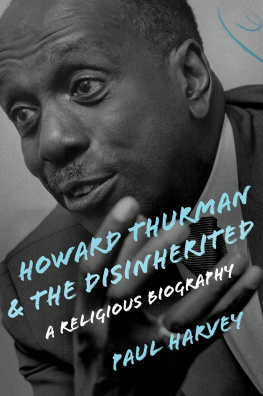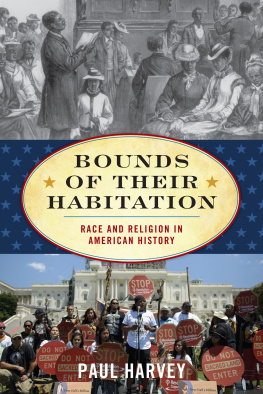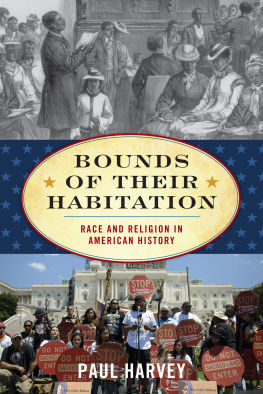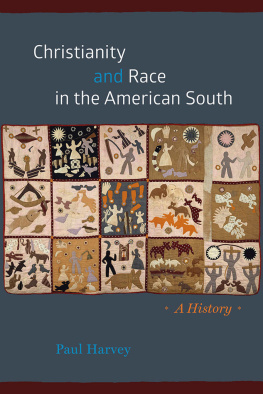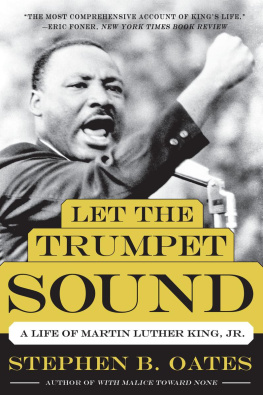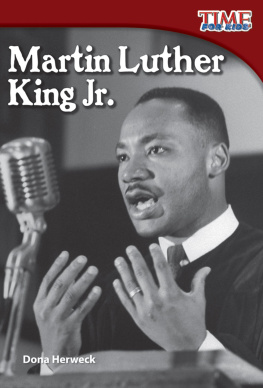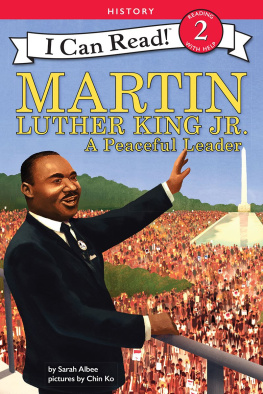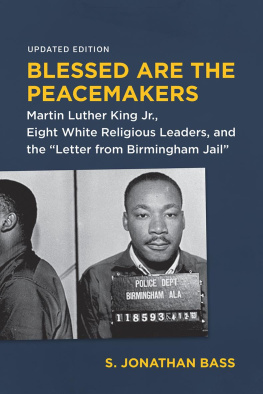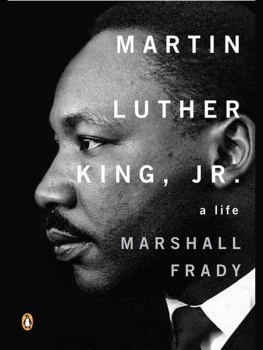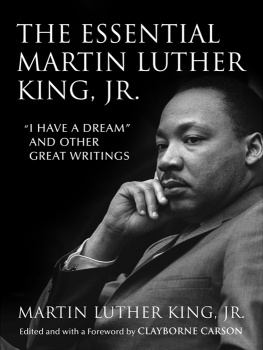M y deepest thanks to the folks at Rowman & Littlefield, especially Jon Sisk and John David Smith, for their faith in this project and great patience in waiting for it as I completed another work in line ahead of it. My thanks also to my friend and fellow biographer of Howard Thurman, Peter Eisenstadt, for his careful reading of the manuscript and numerous suggestions, corrections, and critiques of it, and to my friend and colleague Jeff Scholes, for years of conversations on this and many other subjects in American religious history. Susan Nishida likewise scoured the manuscript with her unerring eye for unnecessary words and phrases and her insistence on getting to the point. Finally, a scholarly note of thanks and gratitude to the numerous scholars and other biographers whose work I have drawn on extensively here and to all over the years who have worked with the Martin Luther King, Jr. Papers Project; all scholars of twentieth-century American history are in their debt.
PROLOGUE
This book is based largely on the writings and oratorysermons, speeches, letters, notes, videos, interviews, etc.of Martin Luther King Jr. The sources are discussed at length in the next section (Primary Sources). I have also been influenced by a number of secondary texts in particular. When these authors are quoted in the text, I have tried to make that clear, so readers may easily follow up on their thoughts, even without having formal endnotes to the chapter.
Here are the most important secondary works (presented in alphabetical order) I have used and, on a few occasions, quoted from. Fuller discussions of their ideas, methods and approaches are in the bibliographic essay below: Lewis V. Baldwin, The Voice of Conscience: The Church in the Mind of Martin Luther King, Jr. (New York: Oxford University Press, 2010); Gary Dorrien, Breaking White Supremacy: Martin Luther King Jr. and the Black Social Gospel (New Haven, CT: Yale University Press, 2018); Michael Dyson, I May Not Get There with You: The True Martin Luther King, Jr. (New York: Simon & Schuster, 2000); David Garrow, Bearing the Cross: Martin Luther King, Jr., and the Southern Christian Leadership Conference (New York: William Morrow, 1986); Michael Honey, To the Promised Land: Martin Luther King and the Fight for Economic Justice (New York: Norton, 2018); Thomas Jackson, From Civil Rights to Human Rights: Martin Luther King, Jr., and the Struggle for Economic Justice (Philadelphia: University of Pennsylvania Press, 2007); Peniel Joseph, The Sword and the Shield: The Revolutionary Lives of Malcolm X and Martin Luther King, Jr. (New York: Basic, 2020); Peter Ling, Martin Luther King, Jr., 2nd ed. (London: Routledge, 2015); Richard Lischer, The Preacher King: Martin Luther King, Jr. and the Word That Moved America (New York: Oxford University Press, 1995); Lerone Martin, Bureau Clergyman: How the FBI Colluded with an African American Televangelist to Destroy Dr. Martin Luther King, Jr., Religion and American Culture 28, no.1 (2018): 151; Keith D. Miller, Voice of Deliverance: The Language of Martin Luther King, Jr., and Its Sources (Athens: University of Georgia Press, 1992); Patrick Parr, The Seminarian: Martin Luther King Jr. Comes of Age (Chicago: Lawrence Hill Books, 2018); Jonathan Rieder, The Word of the Lord Is upon Me: The Righteous Performance of Martin Luther King, Jr. (Cambridge, MA: Harvard University Press, 2008); and Gospel of Freedom: Martin Luther King, Jr.s Letter from Birmingham Jail and the Struggle That Changed a Nation (New York: Bloomsbury, 2013); Tommie Shelby and Brandon Terry, eds., To Shape a New World: Essays on the Political Philosophy of Martin Luther King, Jr. (Cambridge, MA: Harvard University Press, 2018); Jason Sokol, The Heavens Might Crack: The Death and Legacy of Martin Luther King Jr. (New York: Basic, 2018); Douglas Sturm, Martin Luther King, Jr., as Democratic Socialist, Journal of Religious Ethics 18, no. 2 (Fall 1990): 79105; Brandon M. Terry, MLK Now, Boston Review, September 10, 2018, at http://bostonreview.net/forum/brandon-m-terry-mlk-now; and Jeanne Theoharis, A More Beautiful and Terrible History: The Uses and Misuses of Civil Rights History (Boston: Beacon, 2018).
PRIMARY SOURCES
The volume of material written by Martin Luther King Jr., and written about him, is enormous. I have endeavored to read everything published by him, and unpublished as available now in the seven printed volumes and online material of The Papers of Martin Luther King, Jr. I also read as many biographical, theological, critical, historical, and polemical studies of his life and work as I possibly could, in the preparation of this volumebut certainly not all of them. Here, in this short bibliographic essay, I hope to direct attention to the most important and pertinent of the primary and secondary literature, as well as to easily available books and articles.
Since the 1990s, Clayborne Carson (now emeritus professor at Stanford) has directed the Martin Luther King, Jr. Papers Project, with a projected goal of publishing a definitive set of the papers of King over fourteen volumes. So far, seven volumes have been published. They are the basis of all serious writing and scholarship about King. The currently published volumes (noted here just under the general editorship of Clayborne Carson; each individual volume has a varied set of associate editors) include Clayborne Carson et al., eds., The Papers of Martin Luther King, Jr. Volume I: Called to Serve, 1929June 1951 (Berkeley: University of California Press, 1992); The Papers of Martin Luther King, Jr. Volume II: Rediscovering Precious Values, July 1951November 1955 (Berkeley: University of California Press, 1994); The Papers of Martin Luther King, Jr. Volume III: Birth of a New Age, December 1955December 1956 (Berkeley: University of California Press, 1997); The Papers of Martin Luther King, Jr. Volume IV: Symbol of the Movement, January 1957December 1958 (Berkeley: University of California Press, 2000); The Papers of Martin Luther King, Jr. Volume V: Threshold of a New Decade: January 1959December 1960 (Berkeley: University of California Press, 2005); The Papers of Martin Luther King, Jr. Volume VI: Advocate of the Social Gospel, September 1948March 1963 (Berkeley: University of California Press, 2007); The Papers of Martin Luther King, Jr. Volume VII: To Save The Soul of America, January 1961August 1962 (Berkeley: University of California Press, 2014).
All of the volumes are of immeasurable historical significance but. for my purposes, I found particularly crucial volumes I, II, and VI. Volume I reproduces documents from Kings early life, including his teenage years, up to his entrance as a PhD candidate at Boston University. Volume II produces the documents from Kings doctoral study (including a full footnoting and accounting for the plagiarism evident in his PhD dissertation) and from his first months at the Dexter Avenue Baptist Church in Montgomery. Finally, volume VI produces the original typescripts and manuscripts, prior to editing, of many of Kings published books. Through the painstaking work of the editors, we can see what changes Kings published work went through prior to publication. In this way, we sense more clearly what Kings initial unfiltered thoughts were before they were smoothed and sanded down (with his assent and cooperation) for a wider public consumption.
Kings writings and speeches are now readily available in a number of texts that reproduce them. First, of course, are Kings own books, including Stride Toward Freedom: The Montgomery Story (New York: Harper & Row, 1958); Strength to Love (New York: Harper & Row, 1963);


